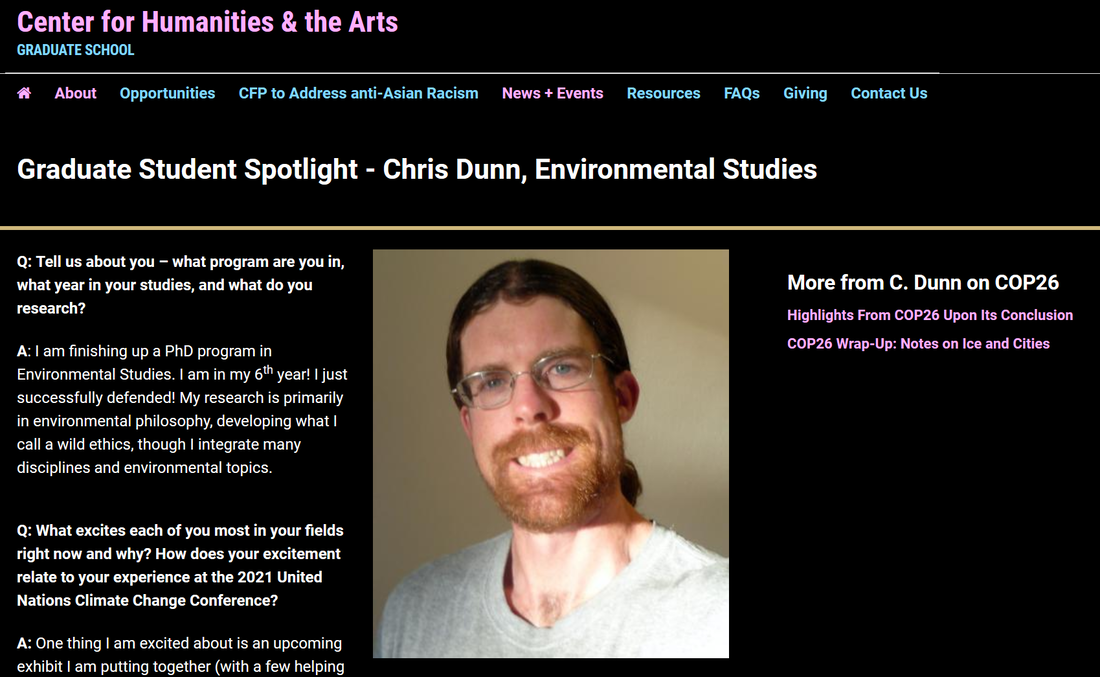|
Here is a new article in the Boulder Weekly about my ongoing Sensing Ice exhibit that touches on my broader (but related) academic research, including some of my reflections on the relations between the humanities and the sciences. I entrusted an undergrad in journalism with some pretty complex ideas. I think it turned out reasonably well.
I'll add just a couple of things that didn't quite get conveyed in this piece: 1) I think that the humanities should engage deeply with the sciences (in sharp contrast to much of so-called "postmodern" thinking), but nevertheless that they should not serve or model themselves off of the sciences (I have in mind here particularly analytic philosophy, which I believe has fallen into this trap). My own approach is dual and seeks partly to bring humanities out into the field, both alongside scientists and as its own unique endeavor. This is contextualized especially by the disturbing, unnecessary, and unfortunate stark decline (in enrollment, academic job prospects [tenured humanities positions], and cultural relevance) of the humanities. 2) A significant portion of this project was undertaken as a solo human-powered expedition that was one of--if not the--hardest journeys I've ever completed. It follows a series of expeditions I have undertaken (especially in Alaska, but also globally) that seek to shine a light on environmental issues in far-flung places--what I call "expeditions with purpose." This is something I hope to continue to develop. 3) My closing statement about the feeling of standing on a remote ridge was nested within a comment (the context of which was dropped) about the long-standing presence of Inuit and other indigenous people's throughout the Arctic. I am well aware of this and in fact have been drawn to the Arctic in part because of this. I believe that wilderness protection (to which I allude at the end, though not by that name) is primarily about staving off industrial incursions and exploitation and need not be contrary to the recognition of landscapes as partly cultural and as traditional homeland. In fact, a persistent theme of my academic inquiry is directed at this complicated intersection between nature and culture. Relatedly, when I use the term "exploration", I mean it in a personal sense (discovery for myself, or at a unique moment in time [everywhere after all--even crowded cities--endlessly await rediscovery--by new eyes and in new moments]), not in an absolute sense. With few exceptions (notably Antarctica), almost everywhere on earth has had other people around for a long time (though to varying degrees - high mountain tops or places like the interior of the Greenland Ice Sheet for instance were far less visited and populated, and undoubtedly at least some pockets of the earth were never visited or populated).
0 Comments
I was recently "spotlighted" by the University of Colorado's Center for Humanities and Arts. Find it here.
|
Chris Dunn, PhD
Researcher, writer, explorer*, photographer, thinker. Wrestling with nature, culture, technology. Archives
July 2024
Categories
All
*When I use the term "exploration", I mean it in a personal sense (discovery for myself, or at a unique moment in time [everywhere after all--even crowded cities--endlessly await rediscovery--by new eyes and in new moments]), not in an absolute sense. With few exceptions (notably Antarctica), almost everywhere on earth has had other people around for a long time (though to varying degrees - high mountain tops or places like the interior of the Greenland Ice Sheet for instance were far less visited and populated, and undoubtedly at least some pockets of the earth were never visited or populated). It is an enlightening experience though when on an isolated ridge in what feels like the middle of nowhere to wonder if anyone has set foot there but never knowing for sure. What is significant is that the landscape itself is left in such a condition that it isn't evident. Some places ought to be kept that way.
|

 RSS Feed
RSS Feed